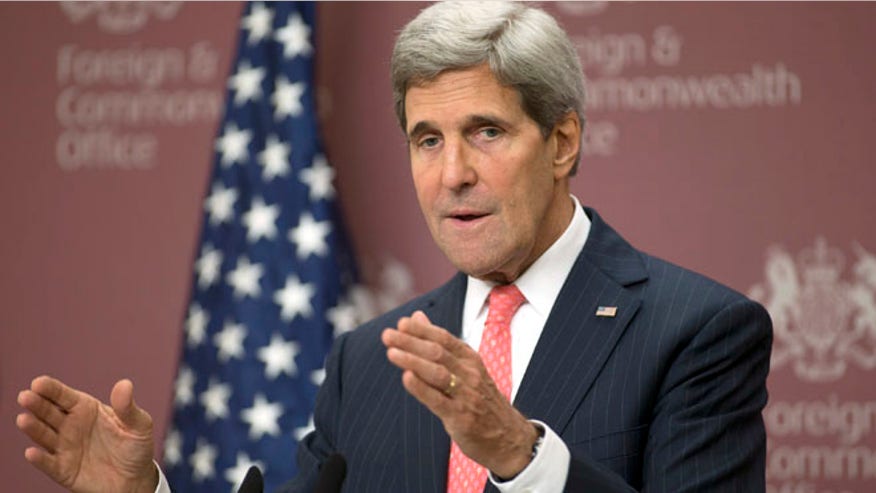Kerry sees Russia, China agreeing on UN resolution on Syria as possible turning point
FoxNews.com

Oct. 22, 2013: Secretary of State John Kerry speaks to the media at the British Foreign Office in London.AP
The agreement calls for Syrian President Bashar Assad's government and opposition forces to provide immediate access across the country to humanitarian aid for all Syrians.
“This could be a hinge-point in the tortured three years of a Syria crisis bereft of hope,” Kerry said. “After three years of slaughter and savagery, people rightfully will question whether progress is possible, but this resolution holds the promise of something real.”
Still, Kerry warned that such an agreement is only the first steps toward ending the international crisis in which hundreds of thousands have been killed and millions forced from Syria and into refugee camps.
“The test is whether the words of the Security Council are matched with the life-saving actions the Syrian people so desperately and urgently need,” he said.
The breakthrough this weekend came when Russia, Syria's closest ally, and China, another supporter, agreed with the Western and Arab-backed resolution.
After two weeks of negotiations and a watering-down of the original text, the two countries decided to join the rest of the 15-member council in sending a strong message, especially to the Assad government, that food, medicine and other essentials must not be blocked to civilians caught in the conflict.
Strong evidence suggests Assad troops killed hundreds Aug. 21 in a chemical weapons attack on rebels in suburb Damascus.
According to the United Nations, 9.3 million Syrians are in need of humanitarian assistance and 6.8 million have fled their homes but remain in the country.
The resolution does not threaten sanctions -- Russia insisted that this reference be dropped from the original text. Instead, it asks U.N. Secretary-General Ban Ki-moon to report to the council every 30 days on implementation and expresses the council's intention to take "further steps" if the resolution's demands aren't fulfilled.
All Security Council resolutions are legally binding, but what remains to be seen is whether this resolution has an impact on the ground, especially since it doesn't have real "teeth."
The resolution demands that all parties, especially the Syrian government, "promptly allow rapid, safe and unhindered access ... across conflict lines and across borders" for humanitarian aid, and it calls on both sides "to immediately lift the sieges of populated areas."
It demands that all parties "cease depriving civilians of food and medicine indispensable to their survival." It also demands a halt to all attacks against civilians, including indiscriminate shelling and aerial attacks using barrel bombs in populated areas.
Russia and China had vetoed three previous resolutions backed by Western nations that would have pressured Assad to end the conflict, which according to activists has killed more than 136,000 people.
Russia's U.N. Ambassador Vitaly Churkin said Moscow supported the humanitarian resolution because "many Russian considerations were borne in mind, and as a result the document took on a balanced nature."
He accused the resolution's sponsors -- Australia, Luxembourg and Jordan -- and its supporters of raising the humanitarian crisis in the council "only after it became clear that attempts to use a deterioration of this humanitarian situation in order to carry out a regime change was unsuccessful."
China's U.N. Ambassador Liu Jieyi strongly urged all parties to implement the resolution "in good faith."
"China is gravely concerned at the worsening humanitarian situation in Syria," he said. "We deeply sympathize with people and we hope to see an early and prompt amelioration of the situation in Syria."
Syria's U.N. Ambassador Bashar Ja'afari Syria told the council that since the beginning of the crisis "the Syrian government was keen to improve the humanitarian situation of the people" and "it has continued to work day and night in order to perform all the humanitarian needs of its citizens."
Ja'afari added that the Syrian government is providing 75 percent of the humanitarian assistance in the country while the U.N. and other organizations have supplied only 25 percent. He accused some unnamed countries of politicizing the delivery of humanitarian aid, misleading international public opinion, and refusing to provide ambulances and wheelchairs for people with special needs.
The main Western-backed Syrian opposition group, the Syrian National Coalition, welcomed the resolution saying the international community should guarantee "full implementation."
The Security Council came together in October to approve a weaker presidential statement on the worsening humanitarian crisis.
The resolution also focuses on strongly condemns the increased terrorist attacks by Al Qaeda and its affiliates and other terrorist groups, calls on the government and opposition to defeat the terrorists, and "demands that all foreign fighters immediately withdraw from Syria."
Churkin said Russia will ask the council to quickly move to discuss a draft document on combating terrorism in Syria.
The resolution also demands that the government and opposition work toward "a genuine political transition that meets the legitimate aspirations of the Syrian people and enables them independently and democratically to determine their own future."
The Associated Press contributed to this report.

No comments:
Post a Comment